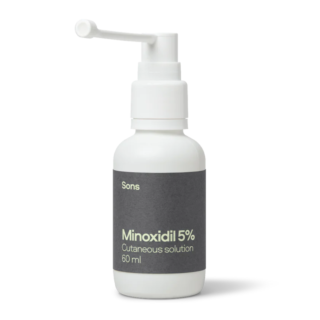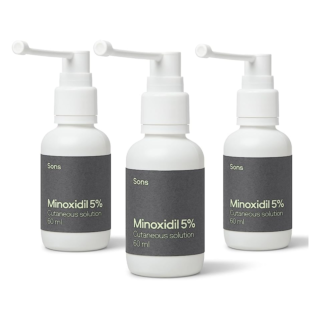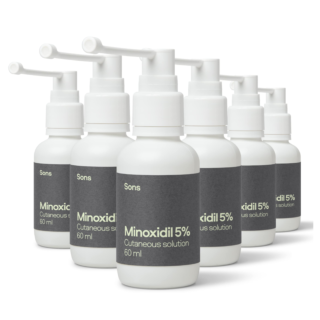Oral Minoxidil vs Topical Minoxidil: What's Right for You?
Early signs of hair loss can impact your confidence. Luckily, there are plenty of options these days not only to stop hair loss but reverse it.
Minoxidil is one of these options. It promotes blood flow to activate dormant hair follicles and turn back the clock on thinning hair. It’s available in topical form, usually as a foam or spray applied directly to the scalp, and as an oral tablet.
So read on below, where we compare oral versus topical minoxidil, including their side effect profiles, effectiveness, and how they’re administered.
Three key takeaways
- Minoxidil is a medication that treats hair loss by widening blood vessels to improve blood flow to the follicles of the scalp.
- It’s available on prescription and over-the-counter as a topical spray or foam, and is prescribed to treat hair loss in oral tablet form off-label (prescribed for a different condition than the one a medication was originally licensed to treat).
- Both oral and topical forms are equally effective at treating hair loss, and the best type for you depends on personal preference and side effect tolerance.

What's the difference between oral and topical minoxidil?
| Oral minoxidil | Topical minoxidil | |
| Average dosage | Typical starting dose:
Women – 0.625mg per day Men 1.25mg per day | 1ml per day (liquid), or 1mg per day (foam) |
| How to use | One pill daily, swallowed with water | Applied directly to the scalp |
| Common side effects | Excess hair growth
Dizziness Fluid retention Increased heart rate Temporary hair shedding Headaches Low blood pressure | Skin or scalp irritation
Dandruff Unwanted hair growth Headaches Increased heart rate Dizziness |
| Suitability | Androgenic alopecia (pattern hair loss)
Men only | Androgenic alopecia (pattern hair loss)
Men and women |
| Availability in UK | Licensed medicine in the UK, but used to treat hair loss only for "off label" indication. Available only on prescription | Licensed and available over-the-counter without prescription |
What's more effective, oral or topical minoxidil?
Both topical and oral minoxidil are effective for slowing or stopping hair loss and stimulating hair regrowth.
How well either works is specific to you as an individual. It varies based on factors like:
- the cause of hair loss
- stage of hair loss
- age
- genetics
- sex
- hormones
- lifestyle choices
A 2023 scientific study comparing the results of topical and oral minoxidil found no significant difference in effectiveness between the two.
The main difference in effectiveness is how long they take to work.
Topical minoxidil can take 8-12 weeks to work, with most people typically seeing significant results after around 3-6 months.
Oral minoxidil typically takes around 3-6 months for visible results.
How to use minoxidil: oral vs topical
Here’s how to take minoxidil:
Oral minoxidil
- Once a day, at the same time each day.
- Swallow with a glass of water.
- With or without food.
- If you miss a dose, do not take a double-dose, take again at your scheduled time.
Topical minoxidil
- Make sure that your hair is clean and dry.
- If you wear it long enough, part your hair to expose the thinning areas.
- Apply the liquid or foam using a spray pump directly to the area.
- Massage the product into your scalp, to help it set in and to stimulate blood flow.
- Do not wash your hair and avoid profuse sweating for at least 4 hours afterwards.
- Apply twice a day, in the morning and evening.
Oral vs topical minoxidil: side effects
Minoxidil is generally well-tolerated. That means not many people will experience minoxidil side effects.
However, it’s still a good be aware of what side effects you may encounter when using the treatment, as they can differ slightly between topical and oral minoxidil.
Common side effects of both include:
- excess or unwanted hair growth
- headaches
- dizziness
- heart palpitations
- temporary hair shedding
Side effects specific to topical minoxidil include:
- skin or scalp irritation where you apply the product
- dandruff
Side effects specific to oral minoxidil include:
- fluid retention
- low blood pressure
- worsening of existing heart problems
Alternatives to minoxidil
Minoxidil may not be suitable for everyone. You might be allergic to some of the ingredients, it may interact with other medicines you’re taking, or you may have sensitive skin.
If you’re looking for fuller, thicker hair but don’t want to use minoxidil you can try:
- Finasteride: also known by the brand name Propecia, this is a pill you take once a day that blocks the enzyme that leads to hair loss, preventing hair loss and promoting hair regrowth.
- Caffeine shampoos: these products cleanse your scalp, removing impurities that cause follicle blockage and contain active ingredients like caffeine and protein to nourish and strengthen hair and stimulate hair growth.
- Hair growth supplements: some products, like Nourkrin, provide vitamins and minerals that help strengthen the hair and follicles, while some affect hormonal changes to promote hair regrowth and prevent shedding.
- Scalp serums: scalp serums are liquid treatments applied topically to the scalp to support follicle health. They typically contain active ingredients like copper peptides, niacin biotin, and caffeine.
- Lifestyle changes: Reducing stress, staying well-hydrated, eating a balanced nutrient-rich diet, and quitting smoking if you smoke, all help to keep hair healthy and improve blood flow.
FAQs
Can I get minoxidil on the NHS?
Topical minoxidil for hair loss is not available on the NHS. It’s available through private prescription or over-the-counter. Oral minoxidil is prescribed on the NHS for low blood pressure, but for hair loss, its use is off-label.
Why don't doctors prescribe oral minoxidil?
Doctors don’t prescribe oral minoxidil for hair loss because it isn’t licensed in the UK for this purpose. Oral minoxidil use for hair loss is off-label.
Is oral minoxidil more effective than spray?
No, studies show that both oral minoxidil and minoxidil spray are equally effective, though they have some different side effects.
Can you stay on oral minoxidil forever?
Yes, clinical studies have found low-dose oral minoxidil to have a very good safety profile for most people. Therefore, most people can take it long-term without any risks.
Sources
- Clinical efficacy and safety of low-dose oral minoxidil versus topical solution in the improvement of androgenetic alopecia: A randomized controlled trial (2023) Journal of Cosmetic Dermatology [Accessed 5 November 2021]
- Minoxidil and its use in hair disorders: a review
- Minoxidil for hair loss NHS [Accessed 5 November 2021]
- Safety of low-dose oral minoxidil for hair loss: A multicenter study of 1404 patients (2021) Journal of the American Academy of Dermatology [Accessed 5 November 2021]
- Topical minoxidil in early male pattern baldness (1985) Journal of the American Academy of Dermatology [Accessed 5 November 2021]












